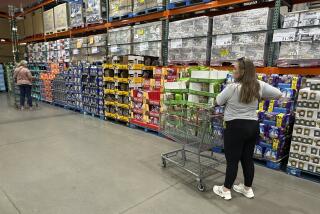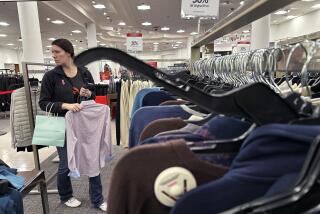Consumer Confidence Shows Big Decline in June Survey
- Share via
Consumer confidence posted its largest one-month drop in June since just after Sept. 11 as a weak labor market, plunging stocks and eroding confidence in corporate America took a toll on the relatively positive mood of Americans, a report said Tuesday.
But responses to surveys and actual behavior often differ, and other figures suggest consumers continue to buttress the economy’s sluggish recovery with hearty spending on big-ticket items such as homes and autos.
Figures out Tuesday on weekly chain-store sales, for instance, showed shoppers had returned in force this month after a weather-imposed pullback in May.
And although consumers might not be feeling so chipper, that had not stopped them from buying new homes. Indeed, disillusion with equities was making housing seem an ever-more-attractive investment option.
Sales of existing homes dipped slightly to a seasonally adjusted annual rate of 5.75 million units in May from 5.77 million in April, but that was still comfortably above analysts’ expectations and the fourth-fastest pace on record.
“People wouldn’t be buying so many homes if they were fearful of their financial future,” said Sal Guatieri, senior economist at Bank of Montreal/Harris Bank in Toronto.
The Conference Board, a private research group, said its closely watched index of consumer confidence fell to 106.4 in June from an upwardly revised 110.3 in May, in line with analysts’ expectations.
Despite the dip the index remains well above the 7 1/2-year low of 84.9 hit last November and at higher levels than seen in the early stages of recovery after the 1990-91 recession.
To analysts that indicates consumer spending should stay solid, a crucial factor given consumption accounts for two-thirds of U.S. economic activity.
The stumble in confidence came as little surprise to financial markets, which had been tipped off by a steep slide in the University of Michigan’s preliminary June survey of consumers earlier in the month.
Many were relieved the drop in the conference measure was not bigger and that gave stocks a brief boost while depressing Treasuries.
James O’Sullivan, an economist with UBS Warburg in Stamford, Conn., said it was the dire performance of stocks that was weighing on consumer sentiment in the first place.
Major indexes have declined in each of the last five weeks, with the broad Standard & Poor’s 500 index losing about 9% during that period.
But it seemed consumers as a whole were not as vulnerable to declining equity valuations as Wall Street liked to think.
“While the stock market is retesting the lows of last fall the confidence index is much higher,” O’Sullivan said.
“The broader point is that the economic numbers are looking more upbeat than the stock market--the market is suggesting a double dip in the economy, the data is not,” he said.
Americans said they had the hardest time finding new jobs in six years, with the number of people saying jobs were “hard to get” increasing to 23.1% from 21.8% in May. Analysts said that rise pointed to little improvement in the jobless rate, currently at 5.8%.
More to Read
Inside the business of entertainment
The Wide Shot brings you news, analysis and insights on everything from streaming wars to production — and what it all means for the future.
You may occasionally receive promotional content from the Los Angeles Times.










